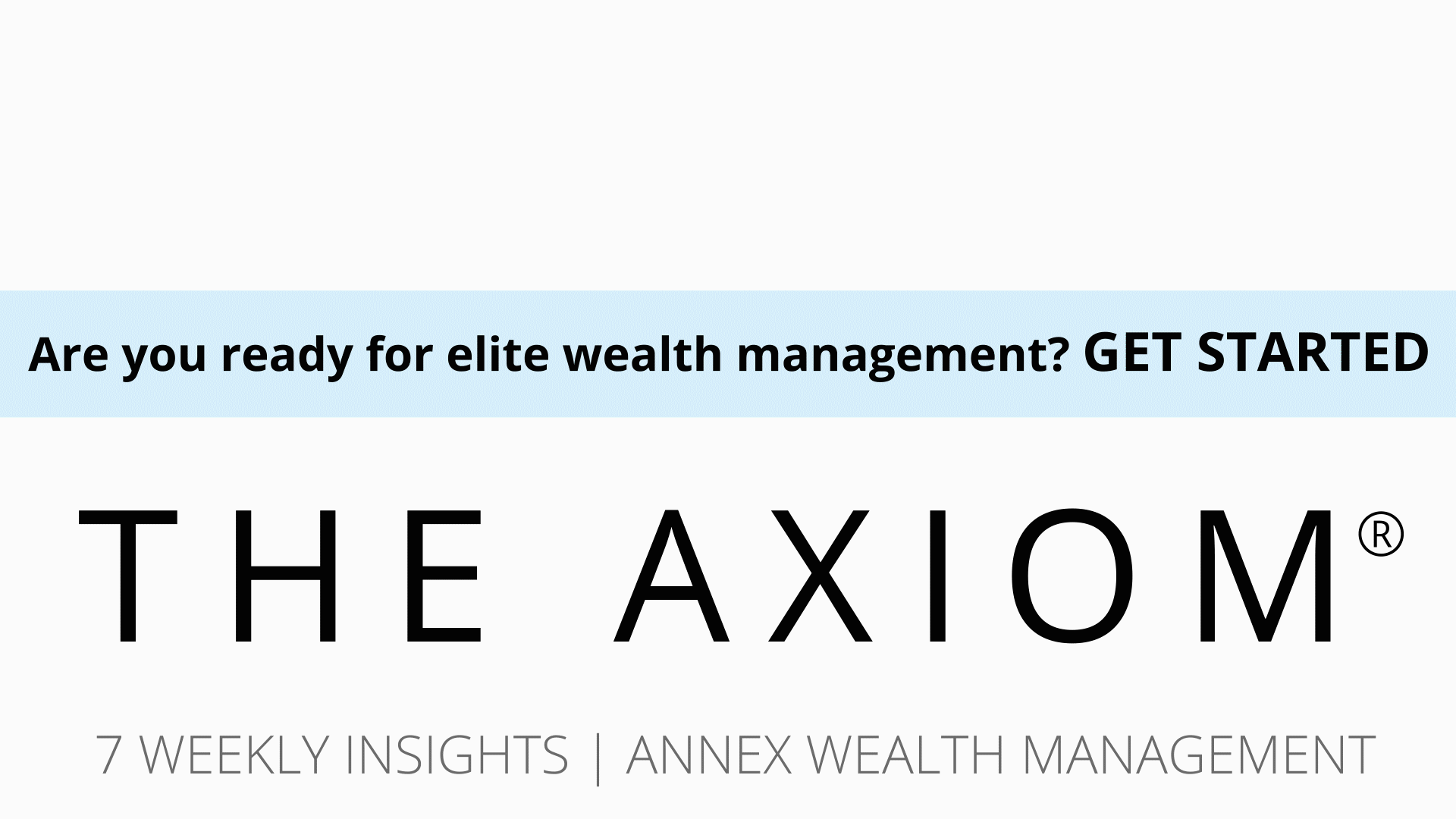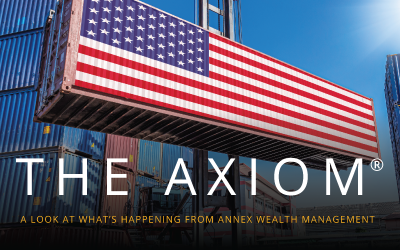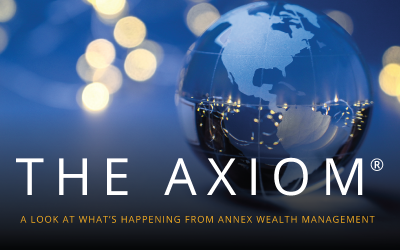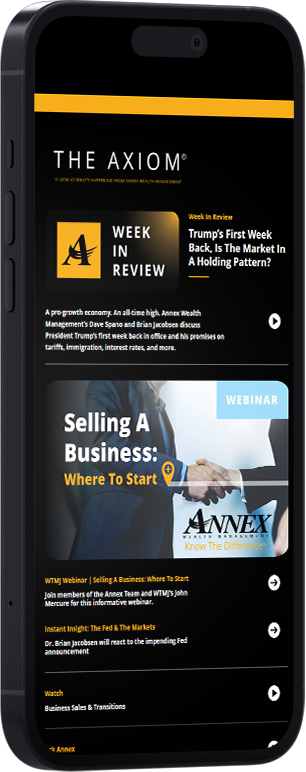
Axiom | Vol 269
Powell’s Dovish Comments Help Make The Case For Equities
Oops! We could not locate your form.

Meet The Axiom®’s Guest Editor: Tom Berkholtz, CFP®
My name is Tom Berkholtz, and I am a Financial Planning Specialist at Annex Wealth Management.
As part of the Financial Planning team, we work closely with Wealth Managers to help prepare financial plans and to conduct portfolio analysis. We also provide specialized ongoing support for a variety of subjects such as tax, insurance, and retirement planning.
BACK TO TOP ↑

Powell’s Dovish Comments Help Make The Case For Equities
Stocks rose after a stellar earnings season and comments by Fed Chairman Powell that appeared to indicate tapering might not include a rate hike. Annex Wealth Management’s Dave Spano and Derek Felske discuss.
BACK TO TOP ↑

Poll Recap: Have you updated your will recently?
Happy National Make A Will Month!
In our previous poll, we asked readers “Do you have a will?” – and the majority of respondents answered yes. This week we dug a little deeper and asked, “Have you updated your will recently?” – this time, the majority of respondents answered no.
If you fall into this category – congratulations on having a will setup! That’s a great first step. But unfortunately, if you don’t keep your will and other estate planning documents up to date, there could be major ramifications down the line.
It’s a good rule of thumb to review your will:
1. After any major life event
2. Every four to five years
– even if you don’t think anything is different. This helps ensure your family stays protected and your final wishes are respected.
BACK TO TOP ↑

Consider Your Options with Your Old 401(k)
You’ve diligently saved to your employer’s 401(k) plan over the years and are now retiring or switching to a different job. What should you do with the funds in your plan? The four main options are to keep the funds in the 401(k), roll the funds over to an individual retirement account (IRA), roll the funds into a new 401(k), or take a lump sum distribution.
In this week’s MoneyDo, we suggest that you consider the pros and cons of these different options so that you can make an educated decision for your old 401(k).
Although taking a lump sum and cashing out the account may be tempting, there are downsides to this option. There could be mandatory taxes withheld along with possible penalties for withdrawal. The lump sum option also reduces the funds earmarked for your future retirement. Due to this, cashing out your 401(k) is usually not the best option.
Rolling over your 401(k) to an IRA can be a good option. This strategy can simplify your financial life by consolidating the funds with other pre-tax dollars you’ve saved. This is especially true if you have multiple old 401(k)’s from previous employers. If that’s your situation, you’ll face added complexity from having several old accounts held at various financial institutions, all being managed by various people. Consolidating these accounts into a single IRA offers simplicity and eases ongoing management.
Another advantage of a 401(k)-to-IRA rollover is the availability of a broader selection of investment options. 401(k)s are typically limited to a smaller selection of investments chosen by the plan sponsor. These options may range in investment quality and level of expense. Funds moved over to an IRA have many more investment options available.
An IRA also offers flexibility for withdrawals. IRA funds can be withdrawn without penalty after age 59½. Also, qualified charitable contributions (QCDs) can be executed upon attainment of age 70½ to reduce taxable income while helping to achieve charitable giving goals. Some 401(k)s may have rigid distribution timelines participants must follow and 401(k) funds are not eligible for QCDs.
For some, the best option may be to leave your money within a 401(k) plan – either with a current or former employer. There are many potential advantages of this strategy. First, you may have the opportunity to take withdrawals from the account beginning at age 55 without penalty. This strategy does, however, require that you separate from service after attainment of age 55. With an IRA, withdrawals prior to age 59½ are subject to a 10% penalty unless special exceptions are met.
Another pro to keeping funds in your 401(k) is that you may have access to 401(k) loans. That’s a benefit you won’t get with an IRA. Here’s another advantage of 401(k) assets: unlimited protection from creditors, civil lawsuit, or bankruptcy. IRAs do not always have such protection, depending on the state you live in. If you’ve begun a new job that offers a 401(k), you may also be able to roll assets into your new employer’s 401(k) and defer required minimum distributions (RMDs) until retirement. An IRA does not offer this flexibility, as under current law, IRA RMD’s are required to begin upon attainment of age 72 regardless of whether you are still working.
It’s important to consider your unique circumstances and goals in determining if it’s best to keep your 401(k) with your previous employer or to roll it over to an IRA. Some key items to consider are your account balance, fees, investment options, and the timeline until you wish to make a withdrawal. Talk with your financial advisor to review the pros and cons of each option for your situation.
BACK TO TOP ↑

“Annex Wealth Management takes a comprehensive team-based approach to financial planning and the weekly AXIOM newsletter is no different. My favorite part about the AXIOM is that it is created every week by different team members who come together offering different ideas, insights, and backgrounds.
Specifically, “Ask Annex” is my favorite section because of all the readers asking great questions.”
– Guest Editor: Tom Berkholtz, CFP® | Financial Planning Specialist
________________________________________
This week’s Ask Annex comes from Mark, who asks:
“What are fiduciary principles and how do I know if a company is being honest about it?”
___________________________
We asked Annex Wealth Management’s Randy Winkler, CFP®:
Fiduciary principles are Loyalty, Care, and Following the client’s instructions.
- Loyalty – the Fiduciary must, at all times, place the interests of the client ahead of their own.
- Care – the Fiduciary must, at all times, use skill, prudence, diligence, and competence. The Fiduciary must be ethical and manage any potential or actual conflicts of interest in the client’s favor.
- Following the client’s instructions – the Fiduciary must, at all times, follow the clients reasonable and lawful instructions.
Special emphasis must be placed on the words “at all times,” since many firms on the financial landscape will describe themselves as a fiduciary. And they are – some of the time. At other times, they do not act as a fiduciary. Current law allows use of the term “fiduciary,” as long as the firm describes explicitly when they are and aren’t acting as a fiduciary.
Those explicit firm descriptions are found in the firm’s SEC Form ADV.
- Form ADV should be a clearly written, meaningful current disclosure of the business practices, conflicts of interest, and background of the investment adviser firm and the firm’s employees who provide advice.
- Every firm that manages over $25 million in assets is required to complete a Form ADV, which is submitted to both the SEC and the state securities authorities.
- Every firm’s form ADV must be readily available. In most cases, you’ll find a link or reference to it in the firm’s website footer or on its “about us” page.
Even though Form ADV is supposed to be written in “plain English,” there’s a chance it could require extra attention and patience to comprehend all that’s described.
One additional way to verify that a prospective firm is a fiduciary all the time, you can have them complete and sign the fiduciary oath found here. http://annexwealth.com/oath/
BACK TO TOP ↑

Is Your Advisor Building A Team Ready To Grow?
Annex Wealth Management has been named a Top Workplace from the Journal Sentinel for three years in a row.(1) As we’ve grown, we’ve worked hard to stay a great place to work, and that means that we’ve added great talent to our teams along the way – while still maintaining our reputation for quality, engaged wealth management.
“Positive workplace culture attracts talent, drives engagement, impacts happiness and satisfaction, and affects performance. The personality of your business is influenced by everything. Leadership, management, workplace practices, policies, people, and more impact culture significantly.”(2)
At Annex, we strive to put people in the right roles to serve our clients. We’re committed to extending our high standard of attention and care in meeting the complete financial needs of families, individuals, and business clients in a fiduciary relationship.
Our team approach means clients consistently interact with a group of experienced professionals boasting key credentials, certifications, and achievements in investment, tax, insurance, estate planning, and more. We’re excited about the talent and experience that we continue to gain with our newest team members at Annex.
We’re happy to introduce some of the newest additions to our Annex family:




BACK TO TOP ↑


KNOW THE DIFFERENCE MINUTE:
JOLTS: Job Openings Hit Record High In June
KNOW THE DIFFERENCE MINUTE:
Millions Stolen In Cyber Hacks: Accenture & Poly Network
MAKE A WILL MONTH
Remarriage Pitfalls
BACK TO TOP ↑

Annex Wealth Management provides free workshops, open to the public, on key wealth management topics.
Each week, we provide links to register for upcoming events.
BACK TO TOP ↑






